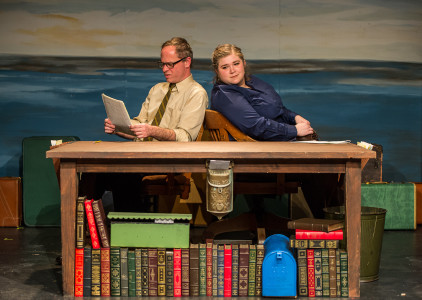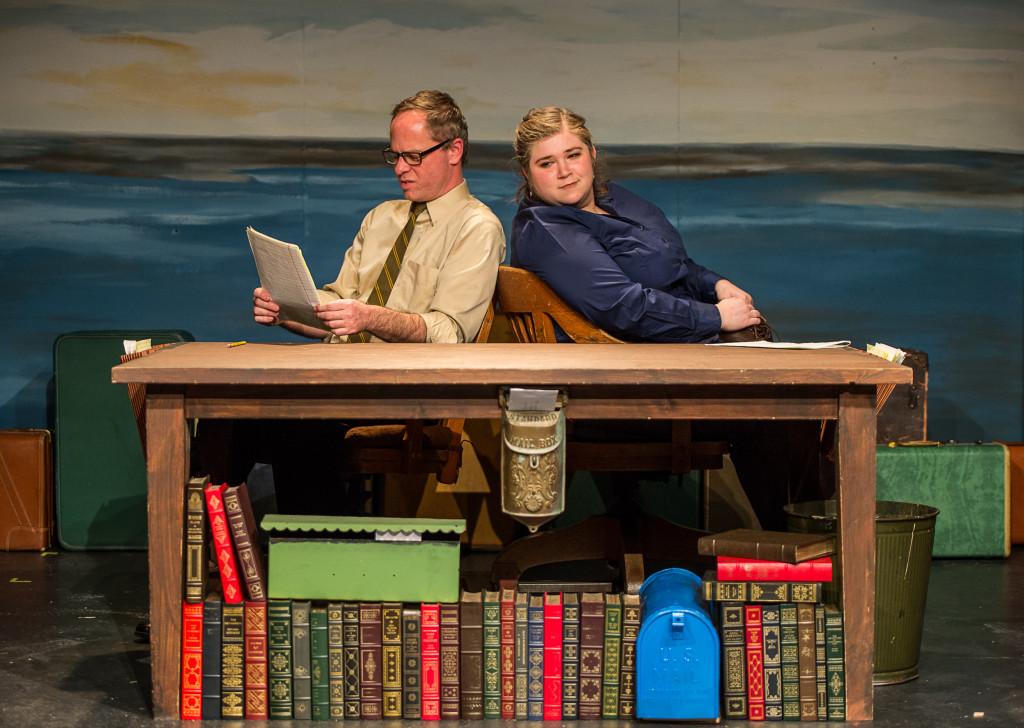Nora Coghlan, News Editor
coghlann17@grinnell.edu
Themes of romance, humor and longing will draw in audiences and light up the Grinnell community this weekend with the Grinnell Arts Center’s production of “Dear Elizabeth.” The show will be playing in the Loft Theatre of the Grinnell Arts Center on Feb. 11, 12 and 13 at 7:30 p.m. and on Feb. 14 at 2 p.m.
“Dear Elizabeth,” by Sarah Ruhl, is based on a series of letters between Elizabeth Bishop and Robert Lowell, two poets in the mid-20th century. The show has only three actors and a very unique format: the bulk of the show portrays Bishop and Lowell reading letters in different locations, very rarely directly interacting.

Because of the small cast and the distinct style, Director Kate Baumgartner ’15 opted to have the actors read their lines from letters on stage, adding to the unconventionality of the production.
“With it being a two person show, that would be a very, very hefty request from the actors to memorize all of that text,” Baumgartner said. “The fact that they are reading and writing letters the whole [time] makes it less obvious than it would be in other plays. “
Baumgartner was initially drawn to the script because of Ruhl’s lyrical voice and writing style.
“Sarah Ruhl is probably my favorite playwright, maybe only second to Shakespeare. I was just rereading a bunch of her plays, and I came across this one that I actually hadn’t found before,” Baumgartner said. “I love the poetic nature of it. She’s an extremely poetic playwright.”
In addition to Baumgartner’s love of the script, she felt that the Loft Theatre offered the perfect setting for such a small production.
“I also thought it would work really well in this space,” she said. “I knew I was going to be in this space and so I wanted to do something small and intimate that wouldn’t work anywhere else.”
The intimate setting of the Loft Theatre compliments the production in a way that a larger theatre would not. It allows for the cast to explore more subtle acting techniques.
“I feel like I’ve seen and worked with a lot of theatre that is very big and melodramatic … and this space is way too small for that to be anything close to interesting,” said Rebecca Patch, Senior Admissions Counselor for the College, who plays Elizabeth Bishop. “I approached it [considering] how little can I show on my face that still says what I want it to say. It’s very different and more technical. It’s micro-expressions instead of large gestures.”
With such a small setting and an even smaller cast, the actors had to spend time getting comfortable with one another and with the unique format of the show.
“It was definitely weird at first. It took us a while to develop the comfort level,” said Craig Gibbens ’95 who plays Robert Lowell. “On the one hand, we’re acting against each other, but we’re not really interacting for most of the play. We’re reading letters, but we’re not supposed to be in the same physical space.”
Along with these unique obstacles, the cast had the added challenge of placing the show in its historical context. Baumgartner and the cast spent time researching mid-20th century poets and poetry to give the show a sense of authenticity.
“Fortunately Kate did a really great job of condensing the research and giving us the Cliff Notes version,” Gibbens said. “We had a few sessions where we went through and said what is this place they’re talking about and how does this all fit together.”
While the historical knowledge has helped the cast create a more authentic experience, it has still been a challenge to portray characters based on real lives.
“They’re real people and in a lot of plays there’s so much more license. Your reactions are whatever you imagine the character to be [but] in this sense they existed and they had really definitive personalities. There’s a lot of historical knowledge of what they were like to feel very tied to who they were as people,” Patch said. “I want to be true to that, in addition to wanting to be true to the actual words.”



















































